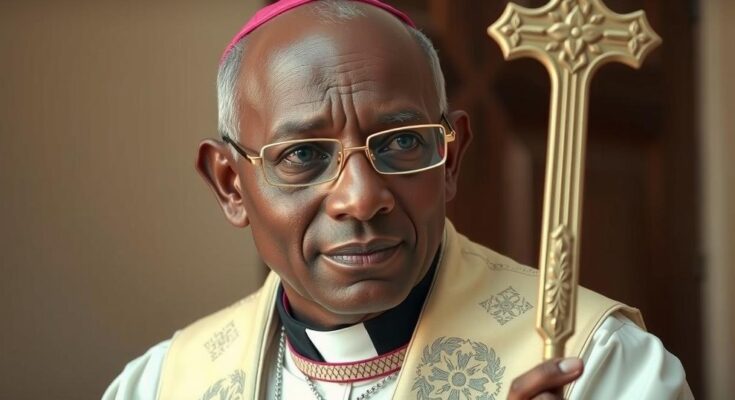Sudanese Catholic Bishop Yunan Tombe Trille Kuku Andali narrowly escaped execution during the ongoing civil war in Sudan after returning from a congress in South Sudan. His experience involved violent encounters with the army and the Rapid Support Forces, underscoring the dire humanitarian situation and commitment of clergy to their communities amidst escalating violence. The ongoing conflict has resulted in tragic loss of life and immense suffering for civilians.
Sudanese Catholic Bishop Yunan Tombe Trille Kuku Andali of El Obeid recently recounted his harrowing experience of narrowly escaping execution while navigating the ongoing civil conflict in Sudan. The bishop’s ordeal occurred after he returned from a Eucharistic congress in Juba, South Sudan, coinciding with talks aimed at resolving the brutal 16-month war between the Sudan Armed Forces and the paramilitary Rapid Support Forces. Upon his return to El Obeid, the bishop faced violent encounters with both the army and the RSF.
In a message shared with his fellow bishops, Bishop Andali described two separate incidents where he faced physical abuse from the Rapid Support Forces, which left him with significant injuries. He highlighted that, during a checkpoint encounter, soldiers confiscated some of his money, claiming it was “forbidden currency.” Later, when confronted by the RSF, he sensed he was being led towards execution until a higher-ranking officer intervened, allowing him and his companion, Deacon Joseph, to escape. Bishop Andali expressed gratitude for the prayers of the church, attributing his survival to divine intervention in a moment that appeared to be aimed at executing them.
Despite the dangers, Bishop Andali remains committed to his parishioners, insisting on his presence until it becomes impossible due to the ongoing violence. He emphasized the urgent need for humanitarian support, as the war in Sudan has already resulted in approximately 61,000 deaths, displacing millions and leaving many more in desperate need of aid. He continues to hold services, underscoring the resilience of the Catholic community in a nation where only 5.4% of the population identifies as Christian, with Catholics representing about 1.1 million individuals.
Furthermore, during a bishops’ meeting, concerns were raised about the persistent conflict and its catastrophic effects on civilians. Cardinal Stephen Ameyu Martin Mulla, president of the Sudan and South Sudan bishops’ conference, condemned the humanitarian crisis, urging communities to reject violence and seek collaborative survival. With peace talks ongoing in Geneva, the situation in Sudan remains precarious, highlighting the need for immediate and robust international intervention to alleviate the suffering wrought by this conflict.
This article highlights the severe challenges faced by religious leaders amidst the civil war in Sudan, which erupted in April 2023 due to escalating power struggles between military factions. The ongoing conflict has led to widespread violence, significant displacement, and a humanitarian catastrophe affecting millions. Bishop Andali’s testimony underscores the perilous conditions for clergy who choose to remain with their communities, emphasizing their commitment amid adversity. The Catholic community in Sudan, although a minority, plays a vital role in providing hope and assistance during these turbulent times, thus drawing attention to the broader implications of the war on humanitarian efforts and the country’s socio-political landscape.
In summary, the experiences of Bishop Yunan Tombe Trille Kuku Andali illustrate the grave risks faced by spiritual leaders amid ongoing civil strife in Sudan. His narrow escape from execution serves as a stark reminder of the pervasive violence and humanitarian crises impacting millions of Sudanese. The bishop’s dedication to remaining with his congregants highlights the critical need for international support and intervention to address the dire humanitarian conditions arising from this conflict. As peace talks continue, the commitment of church leaders and the resilient spirit of their communities remain pivotal in navigating the challenges ahead.
Original Source: www.ncronline.org




